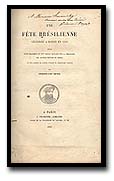


|
DENIS,
Ferdinand.
Une fête brésilienne. Célébrée
a
Rouen en 1550 suivie d'un fragment du XVI siécle roulant
sur la théogonie des anciens peuples du Brésil et des
poésies en langue tupique de Christovam Valente par
Ferdinand Denis. Paris: J.
Techener, Libraire, 1850.
On the first day of October
1550, the city of Rouen, capital of the province of Normandy, offered a
"fête brésilienne" to King Henry II of France and his wife
Catarina de Médici. Tissue and Brazil-wood merchants hoped to convince
the sovereigns to found a colony in the American territory that belonged
to Portugal. On the banks of the Seine were erected some Indian villages
occupied by three hundred Tupi Indians, only about fifty of whom were authentic.
The others were Normandy sailors who knew the Brazilian coast, and prostitutes,
all of them naked to represent Tupinambas reality: cooking, smoking tobacco,
lying in hammocks, hunting and fighting in battles.
This fantasy is the theme
of the book Une fête brésilienne, published in Paris
in 1850.
The author, Frenchman Ferdinand
Denis (1798 – 1890), travelled to South America in 1816 and stayed till
1821, when he returned to Portugal and Spain to study the literature of
those two countries.
On publishing the Scénes
de la Nature sous les Tropiques, in 1824, Ferdinand Denis stated
as his intention to accentuate the influence of Nature on the imagination
of men who live in hot countries, and reveal to Europeans the advantage
they can enjoy from the grand scenes of which they often have only an imperfect
notion, since the climate and the appearance of Nature bear a direct
influence on poetic inspiration. As critic Wilson Martins sees it,
thus began the career of a "tropicologist", rather than a Brazilianist,
and for this very reason F. Denis rather than Gonçalves de Magalhães
should be considered the primary source of our Romanticism. |



